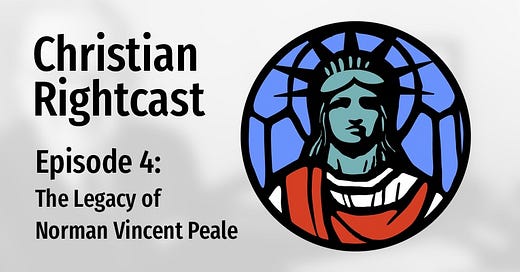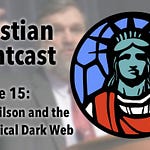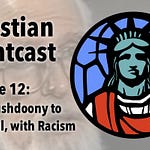Happy Holidays, everyone! This episode is a bit heavier than the previous one, but focuses a critical light on the role that Christian Right ideologies have on current events.
In this second part of our series on pastor, speaker, and writer Norman Vincent Peale, Kristin takes a closer look at the trajectory of Peale’s professional life. We discuss his impact on the relationship between psychiatry and pastoral care, the details of the philosophy he advocated in his bestselling book The Power of Positive Thinking, the impact of his guidance on the Trump family, and the Positive Thinking movement’s role in COVID denialism.
For additional discussion, check out the episode comments on Substack or chime in on Twitter, where we post new announcements and sneak previews of upcoming episodes @CRightcast.
Sources mentioned in this episode include:
God’s Salesman: Norman Vincent Peale and the Power of Positive Thinking, by Carol VR George
Surge of Piety: Norman Vincent Peale and the Remaking of American Religious Life, by Christopher Lane
Blessed: A History of the American Prosperity Gospel, by Kate Bowler
One Nation Under God: How Corporate America Invented Christian America, by Kevin Kruse
Norman Vincent Peale, Smiley Blanton and the Hidden Energies of the Mind., by Donald Capps in The Journal of Religion and Health, vol. 48
The Power of Positive Thinking, by Norman Vincent Peale
A Republic of Mind and Spirit: A Cultural History of American Metaphysical Religion, by Catherine L. Albanese
Too Much and Never Enough: How My Family Created the World’s Most Dangerous Man, by Mary L. Trump
Trump does not demonstrate any of the beliefs that have historically characterized evangelicalism… [u]nlike the majority of American evangelicals, he does not speak about the centrality of the Bible or, like Ronald Reagan and George W. Bush, of being “a born again” Christian. Trump summarizes his faith by saying that he has a “great relationship” with God and that he has never committed any major sins.
— “Why you should know about the New Thought movement”, by Wesley Nitsckie in The Conversation
The origins of New Thought may be traced to a dissatisfaction on the part of many persons with scientific empiricism and their reaction to the religious skepticism of the 17th and 18th centuries. The romanticism and idealism of the 19th century also influenced the New Thought movement, of which Phineas P. Quimby (1802–66) is usually cited as the earliest proponent.
— New Thought, at Encyclopedia Britannica
In theory and practice, New Thought, like Christian Science, is a popular expression of religious idealism, and idealism is the unifying foundation of all forms of New Thought. Emma Curtis Hopkins (1849–1925) is properly cited as the founder of the movement, with its immediate precursors including Mary Baker Eddy (1821–1910) and her Church of Christ, Scientist; Phineas Parkhurst Quimby (1802–1866) and his students; the New England “Mind Cure” movement; and various independent groups and individuals practicing mental healing.
— “The New Thought Movement”, at Encyclopedia.com
According to Mary Trump, her father’s siblings were raised with a few core beliefs: lying was OK — in fact, it was “a way of life”; apologies and displays of emotion or vulnerability were verboten; and bullying was perfectly acceptable, if not encouraged.
— “7 Takeaways From Mary Trump’s Book About Her Uncle Donald”, by Elisabeth Egan in The New York Times
There has been no shortage of explanations—a huge inferiority complex, infantile narcissism, delusional thinking—for Trump’s undying self-assurance. But as I discovered when writing a book about Donald, his father, and his grandfather, if you want to understand what goes on underneath the blond comb-over, you’d do well to look back to two crucial events in the early 1950s. Event No. 1 occurred in October 1952, when a book appeared called The Power Of Positive Thinking… Donald was only 6 years old at the time and didn’t read the book until much later, but it quickly became important in the large Queens household in which he grew up, and it would play a critical role in his future. Event No. 2 in the early 1950s—and in the development of Donald’s personality and style—was the emergence of modern branding… From now on, marketers would not simply tout how well a product performed. Instead, they would study how consumers felt about the maker of the product—and they would bend every effort toward making everything associated with that name as positive and compelling as possible.
— “How Norman Vincent Peale Taught Donald Trump to Worship Himself”, by Gwenda Blair in Politico Magazine
[P]ositive thinking, while helpful, is sometimes conducive to conflating efficacious optimism with fanciful delusion. In politics, as in life, certain obstacles are insurmountable — despite diligent, even prodigious, effort and upbeat thinking. Chapter titles of “The Power of Positive Thinking” include “Expect the Best and Get It” and “I Don’t Believe in Defeat." Peale wrote, “it’s an affront to God for you to have a low opinion of yourself.”
— “Trump’s refusal to concede fits perfectly with the positive-thinking philosophy he learned from Norman Vincent Peale”, by Todd Blodgett in The Des Moines Register
[A]an ethic based on optimism… has a downside noted by the late Stephen Covey in “The 7 Habits of Highly Successful People.” Covey believed that positive thinking was part of the “personality ethic” that spread across America after the First World War. Covey said the personality ethic could be detrimental because it emphasized a person’s attitude and public-relations skills over the person’s character.
— “Is Norman Vincent Peale the reason Trump is so upbeat about the pandemic?”, by Jennifer Graham in The Deseret News
It has been argued that Trump stands as the single most successful practitioner to date of Peale’s philosophy. Surely his careers as a builder and businessman, TV reality show star and media-dominating politician seemed to prove what Peale preached: “What the mind can conceive and believe, and the heart desire, you can achieve.”
— “2020 Crises Confront Trump With An Outage In The Power Of Positive Thinking”, by Ron Elving on NPR
It would be wrong to dismiss Trump’s penchant for hype as merely a cunning attempt to gaslight us (though that is certainly one byproduct). A closer look suggests that Trump actually believes some of the things he wishcasts. As Ted Cruz once observed, “He doesn’t know the difference between truth and lies… Whatever lie he’s telling, at that minute he believes it.” I would take it a step further: It’s not just that Trump believes the things he says, it’s that Trump believes that by believing them, he can actualize them.
— “This Is How Trump Perverted the Power of Positive Thinking”, by Matt Lewis in The Daily Beast














Share this post